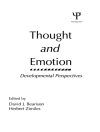Neuroticism–the tendency to experience negative emotions, along with the perception that the world is filled with stressful, unmanageable challenges–is strongly associated with anxiety, depression, and other common mental health conditions. This state-of-the-art work shows how targeting this trait in psychotherapy can benefit a broad range of clients and reduce the need for disorder-specific interventions. The authors describe and illustrate evidence-based therapies that address neuroticism directly, including their own Unified Protocol for transdiagnostic treatment. They examine how neuroticism develops and is maintained, its relation to psychopathology, and implications for how psychological disorders are classified and diagnosed.
表中的内容
1. Perspectives on Temperament and Personality
2. Triple Vulnerability Theory and the Origins of Neuroticism
3. Integrating Temperament into the Study of Emotional Disorders
4. Neuroticism and a Functional Understanding of Emotional Disorders
5. Nosology and Assessment
6. Treatment of Neuroticism
7. Personality as a Basis for Treating Mental Disorders
References
Index
关于作者
Shannon Sauer-Zavala, Ph D, is Assistant Professor in the Department of Psychology at the University of Kentucky and founding Director of Clinical Services at the University’s Clinic for Emotional Health. Her research is focused on exploring emotion-focused mechanisms that maintain psychological symptoms (particularly high-risk symptoms such as suicidal thoughts and behaviors) and using this information to develop more targeted, easily disseminated intervention strategies. Dr. Sauer-Zavala has coauthored over 75 peer-reviewed articles, numerous book chapters, and three books. She is a codeveloper of the Unified Protocol for the transdiagnostic treatment of emotional disorders.
David H. Barlow, Ph D, ABPP, is Professor Emeritus of Psychology and Psychiatry and Founder and Director Emeritus of the Center for Anxiety and Related Disorders at Boston University. Dr. Barlow has published over 650 articles and chapters and over 90 books and clinical manuals, mostly on the nature and treatment of emotional disorders and clinical research methodology. His books and manuals have been translated into more than 20 languages. Dr. Barlow’s numerous awards and citations include psychology’s three highest honors: the Distinguished Scientific Award for the Applications of Psychology from the American Psychological Association, the James Mc Keen Cattell Fellow Award from the Association for Psychological Science, and the Gold Medal Award for Life Achievement in the Practice of Psychology from the American Psychological Foundation.












